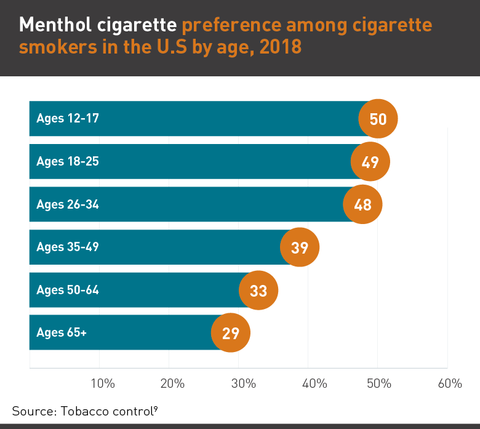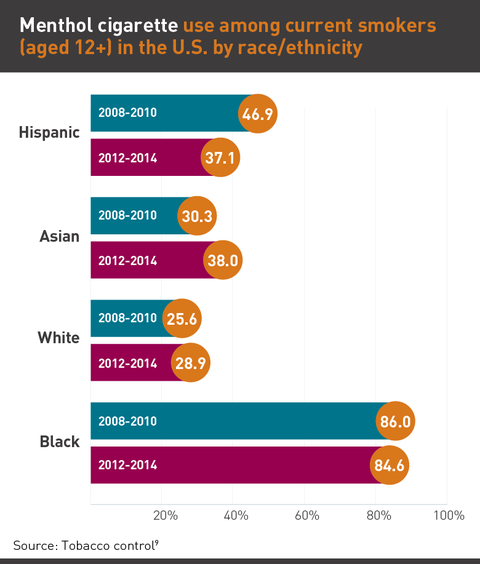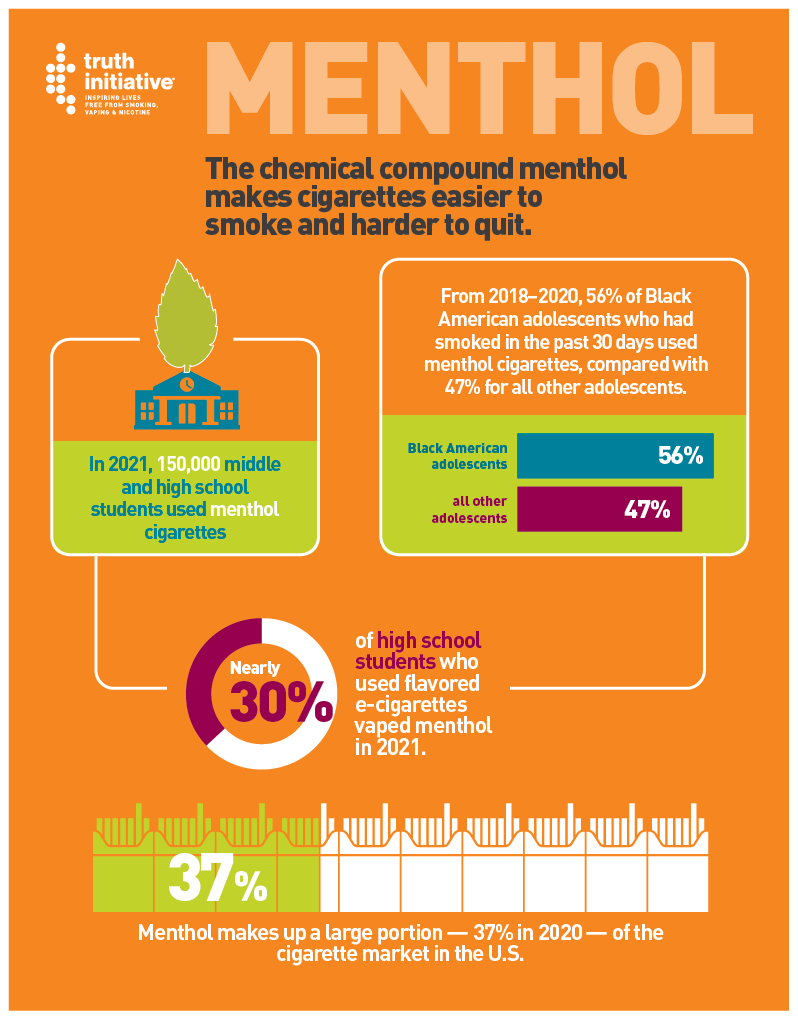Menthol: Facts, stats and regulations
The chemical compound menthol makes cigarettes easier to smoke and harder to quit. Menthol creates a cooling effect, reduces the harshness of cigarette smoke, and suppresses coughing. Those effects may make menthol cigarettes more appealing to young, inexperienced smokers, and research shows that they are more likely to addict youth. Because Black Americans use menthol cigarettes at higher rates, menthol also contributes to health inequities.
Menthol-flavored e-cigarettes, as well as other nicotine-containing products like pouches and lozenges, are also a concern. Among high school students who used flavored e-cigarettes in 2021, nearly 30% used menthol e-cigarettes. And with menthol e-cigarette sales on the rise, there are concerns that menthol in tobacco products most popular with young people are playing a role in addicting a new generation to nicotine.
WHAT IS MENTHOL?
- Menthol is a chemical compound extracted from peppermint or corn mint plants or created synthetically. It reduces the harshness of cigarette smoke due to its characteristic cooling effects on the mouth and throat. It also suppresses the coughing reflex, which makes inhaling smoke from cigarettes more tolerable.
- Menthol was first added to cigarettes in the 1920s and 1930s, and became widespread in the 1950s and 1960s.
- Although most cigarettes contain some menthol, certain brands use menthol in greater quantities, making it detectible as a characterizing flavor. Tobacco manufacturers market and advertise those brands as “menthol cigarettes.”
- Current law prohibits the use of characterizing flavorings in cigarettes, except for menthol. Public health groups have urged the Food and Drug Administration to remove menthol flavor from cigarettes, cigars, and cigarillos for over a decade. After being sued for inaction on this issue, the FDA reported in April 2021 that it plans to move forward to remove menthol from cigarettes and all flavors, including menthol, from cigars. In October 2023, the proposal was finalized by the FDA and sent to the White House Office of Management and Budget for review, marking a momentous step toward a major public health victory.
- Although the FDA effectively removed certain cartridge-based flavored e-cigarettes products in 2020, menthol was one of the many exemptions to the policy. The FDA is currently deliberating on whether menthol e-cigarettes currently on the market are appropriate for the protection of public health.
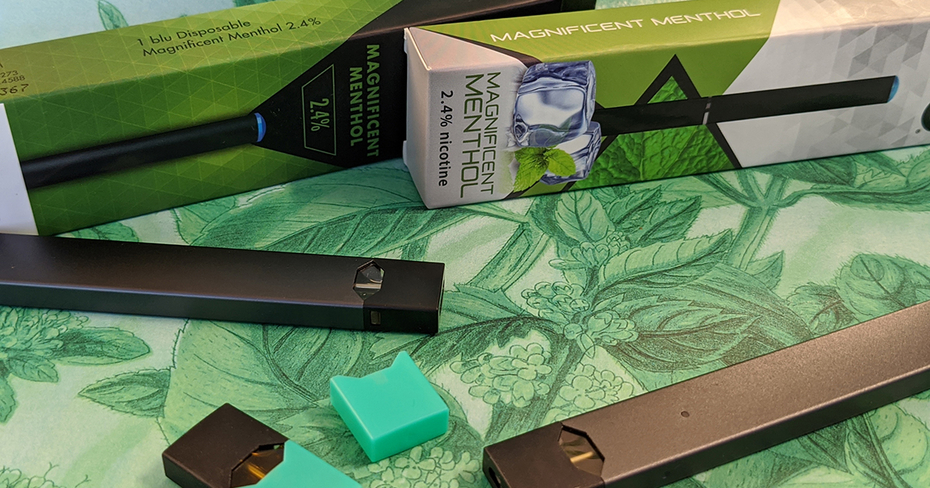
Although the FDA effectively removed certain cartridge-based flavored e-cigarettes products in 2020, menthol was one of the many exemptions to the policy.
PATTERNS OF USE IN THE U.S.
- In 2018, 6.85% of people aged 12 or older used menthol cigarettes.
- Menthol cigarettes are slowing the reductions in overall cigarette smoking rates. From 2005 to 2015, the decline in cigarette consumption was greater for non-menthol cigarettes than menthol cigarettes.
- Between 2005 and 2015, non-menthol cigarette use among those 18+ decreased overall from 14.7% to 9.6%, according to research published in 2020. For the same group and timeframe, menthol cigarette use decreased overall from 5.3% to 4.4% — a much slower rate of decline, indicating that menthol cigarettes are slowing the decline of tobacco use in the U.S. And although use of menthol cigarettes significantly decreased for groups including women, 18- to 24-year-olds, 35- to 54-year-olds, non-Hispanic Whites, participants with high school degrees/GEDs, those with higher incomes, and those living in the northeast, there were greater decreases in the same groups for non-menthol cigarettes.
- Menthol cigarette use remained stable or did not significantly decrease among males, adults ages 25–34 and 55+, American Indians/Alaskan Natives, and Hispanics between 2005 and 2015.
- Menthol smoking prevalence now exceeds non-menthol smoking prevalence among both youth and young adults.
- Research shows an association between menthol tobacco use and mental health symptoms:
- Tobacco users who currently used menthol-flavored tobacco products reported anxiety and depression at higher prevalence than non-menthol tobacco users.
- Menthol cigarette use was correlated with more lifetime psychiatric hospitalizations in a study of young adult smokers with severe mental illness.
- Among individuals with substance abuse disorders, more than half (53.2%) of smokers used menthol cigarettes, compared to 30% of smokers in the general population who did so.
- Youth remain the age group most likely to use menthol cigarettes.
- Among current cigarette smokers (those who have smoked in the past 30 days), 39.9% used menthol cigarettes in 2018, compared to 38.8% from 2012 to 2014 and 35% from 2008 to 2010.
- Menthol cigarette smoking is more prevalent among youth, female smokers, racial and ethnic minorities, sexual minorities and those with mental illness.
- Black American smokers predominantly use menthol cigarettes. As of 2020, 81% of Black smokers use menthol cigarettes.
- Menthol cigarette use is significantly lower among youth whose parents had at least a college degree compared to those with less education. Young people also exclusively used menthol cigarettes at significantly lower rates if their annual household income was high and if they lived in a home that was owned rather than not.
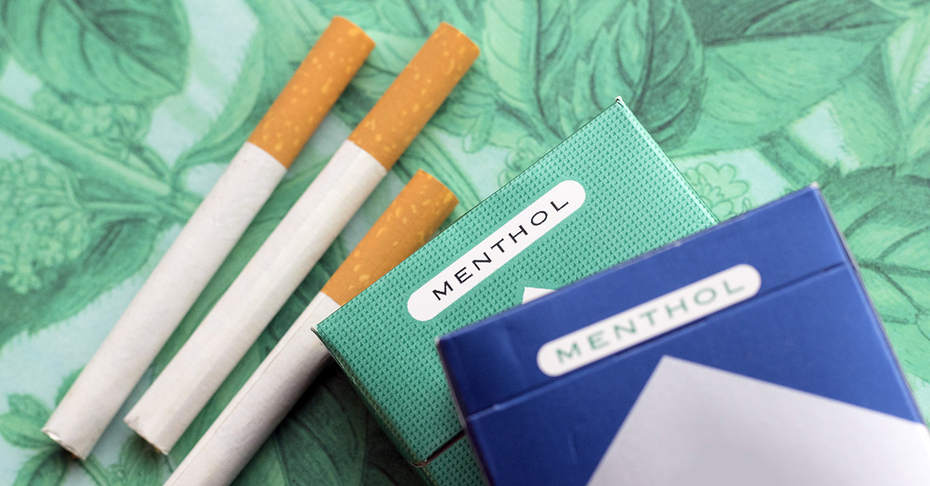
Tobacco users who currently used menthol-flavored tobacco products reported anxiety and depression at higher prevalence than non-menthol tobacco users.
YOUTH AND YOUNG ADULTS
Young people use menthol tobacco products, including cigarettes and e-cigarettes, at disproportionally high rates, which could facilitate nicotine addiction.
CIGARETTES
- Menthol reduces the harshness of cigarette smoke, which may appeal to young, inexperienced smokers.
- Preference for menthol among cigarette smokers remains inversely correlated with age: 49.7% of 12-17-year-old cigarette smokers used menthol compared to 29.2% of those 65 years old or older in 2018.
- Longitudinal studies show that initiation with menthol cigarettes facilitates progression to established cigarette use among young smokers.
- In young people, using menthol cigarettes and cigars first is associated with continued cigarette use. Data from nationally representative samples show that the youngest cigarette smokers use menthol at the highest rates (Figure 1).
- In 2021, 150,000 middle and high school students used menthol cigarettes, based on the National Youth Tobacco Survey. 38.8% of middle and high school students who used cigarettes used menthol cigarettes.
- A nationally representative study found that, among youth and young adults, non-menthol cigarette prevalence declined from 2004 to 2010. By contrast, menthol cigarette prevalence remained constant among youth and increased among young adults over this period.
E-CIGARETTES
- Flavors are a top reason why young people begin using e-cigarettes. Research shows that mint and menthol e-cigarette use among high school users rose from 16% in 2016 to 57.3% in 2019. Among high school JUUL users, 67.5% reported that their preferred flavor was mint or menthol. Another study, conducted before JUUL pulled its other flavors from the market, found that mint was one of the most popular flavors among high school student JUUL users, but that menthol was less so. Study authors caution that leaving mint and menthol flavors on the market undermines the purpose of removing flavors — which is to prevent kids from using e-cigarettes at all.
- In 2021, 470,000 middle and high school students used menthol-flavored e-cigarettes in the past 30 days, according to the NYTS.
- Among high school students who currently used any type of flavored e-cigarettes, in 2021, 29.8% used menthol-flavored e-cigarettes.
- Menthol-flavored e-cigarettes continue to rise in popularity. By March 2020, menthol-flavored e-cigarette sales had risen to an all-time high of 57.7% market share.
MINORITY GROUPS
CIGARETTES
- Menthol cigarettes disproportionately harm Black Americans. Among Black Americans over 1980-2018, menthol cigarettes were responsible for 1.5 million new smokers, 157,000 smoking-related premature deaths and 1.5 million life-years lost, according to a 2021 study published in Tobacco Control. While Black Americans constitute 12% of the total U.S. population, these figures represent, respectively, 15%, 41% and 50% of the total menthol cigarette-related harm.
- Most Black American youth smokers use menthol cigarettes. From 2008 to 2010, 94.9% of Black American youth current smokers used menthol cigarettes. Other racial and ethnic groups used them in lower numbers, including just over half — 51.3%— of white youth current smokers.
- From 2008 to 2010, menthol cigarette use among young adult current smokers (ages 18 to 25) was 93.9% among Black Americans, compared with 36.3% among whites, 47.3% among Hispanics and 49.7% among Asian Americans.
- Menthol and non-menthol cigarette use among adolescents fell by more than half between 2012 and 2020. From 2018-2020, 0.95% of Black American adolescents smoked menthol cigarettes in the past 30 days, about half of the 1.98% of non-black adolescents who smoked menthol cigarettes. Menthol use went down for Black American adolescents but not significantly as it did for adolescents who were white, Hispanic, or other race/ ethnicities. From 2018–2020, 56% of Black American adolescents who had smoked in the past 30 days used menthol cigarettes, compared with 47% for all other adolescents. From 2012–2014, a majority of both Black American (68%) and all other adolescent smokers (51%) used menthol cigarettes.
- In 2020, 51% of lesbian and gay smokers and 46% of bisexual smokers used menthol cigarettes, compared with 39% of heterosexual smokers.
E-CIGARETTES
- Black American young adults between the ages of 18-34 were less likely to use non-tobacco and non-menthol flavored e-cigarettes than white respondents, according to research published in Drug and Alcohol Dependence in 2018.
- White youth were dual users of e-cigarettes and menthol cigarettes at higher rates compared to Black American youth (2.2% vs. 0.3%).
HEALTH EFFECTS
Menthol cigarettes offer no health benefit to smokers, and, in fact, are easier to start smoking and more difficult to quit than regular cigarettes. Truth Initiative agrees with the Tobacco Products Scientific Advisory Committee that menthol cigarettes pose a threat to public health above and beyond that posed by regular cigarettes.
- Menthol flavoring contributes to addiction in youth smokers.
- Recent research points to multiple mechanisms that may play a role in the addictive potential of menthol. Menthol fundamentally alters nicotine receptors, masks the adverse sensory properties of tobacco products (which ultimately may enhance nicotine intake and drive relapse), and alters nicotine metabolism, increasing its bioavailability, according to a 2020 review published in Nicotine & Tobacco Research
- Adolescent menthol smokers show significantly higher levels of nicotine dependence, tolerance and emotional attachment to cigarettes, compared to non-menthol smoking peers, according to a 2020 study.
CIGARETTES
- There are no health benefits associated with smoking menthol cigarettes, compared with smoking non-menthol cigarettes.
- Menthol cigarettes are as dangerous to an individual’s health as non-menthol cigarettes, and menthol cigarette smokers are as likely to experience premature morbidity and mortality as non-menthol cigarette smokers.
- Menthol cigarettes were responsible for 10.1 million extra smokers, 3 million life years lost and 378,000 premature deaths between 1980 and 2018, according to a 2021 study published in Tobacco Control. Menthol cigarettes were also responsible for slowing down the decline in smoking prevalence by 2.6% (from 13.7% in 1980 vs. 11.1% in 2018).
- Adult menthol smokers report taking less time to have their first cigarette after waking than non-menthol smokers. Time to first cigarette is an important indicator of nicotine addiction. Scientific evidence establishes that adult menthol smokers are less likely than non-menthol smokers to successfully quit smoking despite greater quit intentions and quit attempts. Studies show significantly reduced rates of quitting among African American and Hispanic menthol smokers compared with non-menthol smokers.
- Adolescent menthol cigarette smokers were more likely to smoke more frequently and be more dependent on cigarettes compared to non-menthol cigarette smokers. Adolescents who smoked menthol cigarettes were less likely to report intentions to quit in the next year, a finding that runs counter to trends in adult menthol smokers.
E-CIGARETTES
- In menthol-flavored e-cigarettes, there are health concerns related to pulegone — a compound found in prepared oil extracts of certain mint plants. Pulegone is a known carcinogen, and the tobacco industry has in the past reduced the amount of this compound in menthol tobacco products as a result of toxicity concerns. The FDA banned pulegone as a food additive in 2018, yet studies have identified that substantial amounts of this additive are found in mint and menthol e-liquid in the U.S. — raising concerns about the potential toxicity of these popular flavors.
- Young people who vape fruit-, menthol-, and mint-flavored e-cigarettes with higher nicotine concentrations had greater nicotine dependence compared to those who used e-cigarettes with lower nicotine levels, according to a 2021 Truth Initiative study.
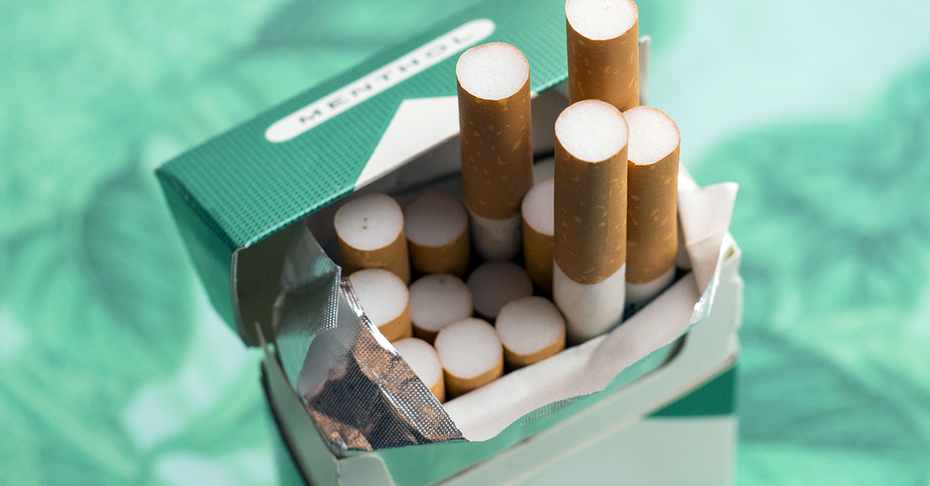
Menthol cigarettes offer no health benefit to smokers, and, in fact, are easier to start smoking and more difficult to quit than regular cigarettes.
MARKETING IN THE U.S.
- Menthol makes up a large portion of the cigarette market in the U.S.: 37% in 2020, up from 26% in 2000.
- The tobacco industry has a well-documented history of developing and marketing mentholated brands to racial and ethnic minorities and youth.
- In a national sample of U.S. tobacco retailers, price promotions for the Newport brand of menthol cigarettes were nearly twice as common in neighborhoods with the highest proportion of Black residents, and prices for Newport cigarettes were cheaper in neighborhoods with the greatest proportion of youth, Black residents, and lower-income households.
- Young people living in areas with lower incomes, higher proportions of racial/ethnic minorities, and higher smoking rates in D.C. had 7.2 times the odds of being exposed to flavored tobacco marketing, compared with those not living in those communities according to a 2021 Truth Initiative study published in the Annals of Behavioral Medicine.
- Tobacco stores in Washington, D.C. neighborhoods with higher percentages of Black residents had more marketing for flavored tobacco products — especially for flavored cigars — compared to neighborhoods with lower percentages of Black residents, according to a 2022 study published by the University of Kentucky College of Medicine in collaboration with Truth Initiative researchers.
- Similar marketing trends were seen in California, where tobacco retailers in neighborhoods with greater proportions of Black residents were significantly more likely to advertise menthol cigarettes compared to stores in neighborhoods with the lowest proportion of Black residents, according to a 2021 study published in Tobacco Control. The study also found that Newport cigarettes were about 25 cents cheaper in neighborhoods with higher proportions of Black residents, compared to stores with the lowest proportion of Black residents.
- Evidence from tobacco industry documents shows that the industry studied smokers’ menthol preferences and manipulated menthol levels to appeal to a variety of smokers, including adolescents and young adults.
- Evidence from tobacco industry documents also shows that tobacco companies specifically targeted Black Americans with menthol cigarette advertising.
- A 2011 review found that menthol marketing is higher in publications and venues that appeal to Black American audiences.
- Numerous studies show targeted marketing of menthol cigarettes at the point of sale in Black American communities throughout the U.S.
POLICY IN THE U.S.
- The 2009 Family Smoking Prevention and Tobacco Control Act gave the FDA the authority to regulate tobacco products. The law specifically prohibits the use of characterizing flavorings in cigarettes, except for menthol.[76] Nonetheless, it preserves the FDA’s regulatory authority to ban menthol.
- In March 2011, The Tobacco Products Scientific Advisory Committee (TPSAC) published a review of menthol cigarettes’ effect on youth and other vulnerable populations, a requirement of the Tobacco Control Act. The committee concluded that “the removal of menthol cigarettes from the marketplaces would benefit public health in the United States.”
- Lorillard Tobacco Company (now R.J. Reynolds Tobacco Company) challenged the integrity of the TPSAC in a lawsuit against the FDA, alleging that several experts the agency appointed to the committee were conflicted and therefore must be removed. The judge in the case sided with Lorillard and prohibited the FDA from using the TPSAC menthol report. The FDA appealed, and, in January 2016, the D.C. Circuit reversed the district court’s decision, allowing the agency to rely on the TPSAC menthol report to take action to regulate menthol tobacco products.
- In July 2013, the FDA published its own report that also concluded that the removal of menthol cigarettes from the market would improve public health. At the same time, the FDA requested public comment seeking additional information to help the agency make informed decisions about menthol in cigarettes. In March 2018, the FDA again requested public comment on the role that menthol in tobacco products plays in attracting youth, in the likelihood of quitting smoking, and in the use of other tobacco products, including cigars and e-cigarettes.
- In April 2021, in response to a citizen petition and a lawsuit from public health groups against the FDA for delaying banning menthol, the FDA announced plans to move forward to remove menthol from cigarettes and remove all flavors, including menthol, from cigars.
- In April 2022, the FDA proposed product standards to prohibit menthol as a characterizing flavor in cigarettes and prohibit all characterizing flavors in cigars.
- In October 2023, the FDA sent the proposed rules to remove menthol cigarettes and flavored cigars from the market and to the White House Office of Management and Budget for final review, a long-awaited development since the FDA announced the proposal in 2021.
- In December 2023, the Biden Administration delayed finalizing the proposed rules until March 2024.
STATE AND LOCAL POLICIES
While many localities have prohibited flavored tobacco products in some way, most of these exclude menthol, mint or wintergreen. However, several localities do include menthol in their flavor bans.
As of September 30, 2023, 127 jurisdictions have fully comprehensive policies that prohibit sales of all types of flavored tobacco products, including menthol/mint/wintergreen tobacco products, at all retailers. Despite research showing that menthol cigarettes are easier to start smoking and harder to quit,70 only 2.96% of the U.S. population is covered by a comprehensive state or local flavored tobacco sales restriction.
Research provides strong evidence that local policies restricting flavored tobacco products reduce availability, marketing, and sales of such products — some of the immediate intended outcomes of the legislation, according to Truth Initiative research published in Nicotine & Tobacco Research.
As of September 30, 2023:
- Massachusetts prohibits the sale of all flavored tobacco products, including menthol, except in smoking bars.
- In California, 94 localities including Los Angeles County, Oakland, Sacramento, and San Francisco, prohibit the sale of all flavored tobacco products, including menthol.
- Six localities in Colorado, including Aspen, prohibit the sale of all flavored tobacco products, including menthol.
- Five localities in Maine prohibit the sale of all flavored tobacco products, including menthol.
- 10 localities in Minnesota prohibit the sale of all flavored tobacco products, including menthol.
- Manheim, New York prohibits the sale of all flavored tobacco products, including menthol.
- Chicago, Illinois prohibits the sale of flavored tobacco products, including menthol, within 500 feet of any city high school.
Tobacco Industry Opposition
At the local, state and national levels, the tobacco industry has worked hard to undermine government efforts to restrict the availability of menthol tobacco products. In California, a bill prohibiting the sale of most flavored tobacco products was signed into law in August 2020, despite heavy opposition from the tobacco industry. In fact, the industry implemented a media blitz of television and social media ads, arguing the law would increase racial profiling by law enforcement. The tobacco industry then was able to gather enough signatures to seek a referendum, which Californians will vote on in November 2022. As of December 31, 2021, the political action committee to overturn the law has contributed more than $21 million to the campaign, including $10.3 million from R.J. Reynolds and $9.8 million from Philip Morris.
The industry often cites a concern that eliminating menthol will lead to a market for dangerous illicit trade, despite sparse and overstated evidence to support that concern. Research shows that illicit menthol cigarette purchases were low following the removal of menthol in seven Canadian provinces. The tobacco industry has also attempted to spread fear that a rule to eliminate menthol would unfairly target Black Americans and would lead to further criminalization of the community. R.J. Reynolds, also the maker of the leading menthol cigarette brand Newport, recruited prominent Black leaders, including civil rights activist Rev. Al Sharpton, to host town halls across the country on the subject. The public health community criticized these events as deceptive and exploitative.
The tobacco industry also opposes menthol sales restrictions by warning of severe economic losses for communities. A case study of Minneapolis and Saint Paul, Minnesota co-authored by Truth Initiative researchers shows that restricting menthol cigarette sales from convenience stores in the two cities would result in projected annual profit losses of about $6M for Minneapolis and $4M for Saint Paul — contrasting sharply with tobacco industry estimates of losses of at least six times greater. Also, the number of tobacco retailers in both cities remained largely the same as it was prior to the removal of menthol cigarettes and cigars, suggesting economic stability. The Minnesota examples suggest that it is possible to successfully implement flavor regulations without an overwhelmingly negative economic impact for tobacco retailers.
ESTIMATED EFFECTS OF ELIMINATING MENTHOL IN THE UNITED STATES
UNITED STATES
- A hypothetical removal of menthol cigarettes and cigars in the U.S. would reduce overall smoking by 15% by 2026 due to menthol smokers quitting smoking and vaping, according to study published in the British Medical Journal in 2022. The study also finds that by 2060, a national rule to eliminate menthol would reduce cumulative deaths from smoking and vaping by 650,000 (5%) and save 11.3 million life-years (8.8%).
- A hypothetical removal of menthol cigarettes and cigars in New York City was projected to save an average of $1,836 in healthcare costs per person, or $1.62 billion among all adult smokers over a 20-year period.
- A study of U.S. adult menthol smokers found that removing menthol cigarettes or all menthol products was effective in reducing cigarette purchases, but that tobacco marketing strategies including offering replacement products might undermine the benefits of such a policy.
- CDC data collected in 2021 shows that most U.S. adults (62.3%) support policies to eliminate menthol cigarettes, with 57.3% supporting a policy prohibiting the sale of all tobacco products. This number has grown since data was collected in a 2018 survey, which found that 56.4% of adults reported supporting the federal removal of menthol cigarettes.97 The 2018 survey also found that support was especially strong among Black Americans (60.5%) and other groups who have been targeted by the tobacco industry, including women (62.5%) and Hispanic/Latinos (69.3%).
- Among U.S. smokers, about 25–64% would attempt to quit smoking and 11–46% would consider switching to other tobacco products, including 15–30% to e-cigarettes, in response to a hypothetical rule to eliminate menthol.
- Black Americans smokers were more likely to report intentions to quit (47%) compared to white individuals (34%), according to a 2020 review of the effects of eliminating menthol. A survey of menthol smokers in Minnesota also found that Black American menthol smokers were twice as likely to report quitting intentions compared to white menthol smokers (76.0% vs. 30.3%, respectively).
- Among young adult menthol smokers (aged 18-24), 64.6% reported that they would quit smoking and not use any other products if menthol cigarettes were removed from the market.
- Adult dual users of e-cigarettes and cigarettes who used menthol cigarettes were more likely to prefer menthol flavored e-cigarettes compared to other flavors.
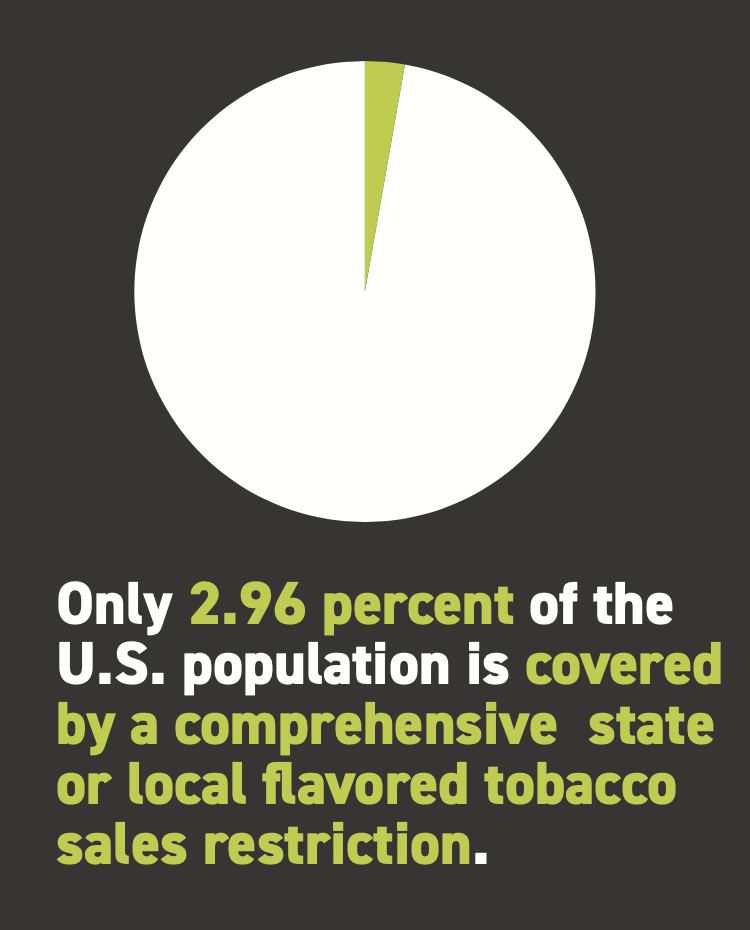
INTERNATIONAL
- Rules to eliminate menthol were found to reduce sales and increase smoking cessation with only partial substitution for non-menthol cigarettes, according to an international review of implemented and hypothetical menthol bans.
- A 2017 removal of menthol tobacco products in Ontario, Canada resulted in significant reduction in menthol cigarette and total cigarette sales after the policy went into effect, compared to a province without a menthol policy. Although most smokers who used menthol cigarettes before they were eliminated in certain provinces in Canada switched to non-menthol cigarettes, 21.5% quit smoking. Menthol smokers were 1.6 times more likely to try to quit and 2.3 times more likely to remain quit compared to non-menthol smokers. In Alberta, Canada, after a policy to remove menthol went into effect, brands that identified as menthol before the removal were repackaged after the ban to convey that they were menthol replacements.
- A policy to eliminate menthol-flavored cigarettes went into effect in EU countries in May 2020, but removes menthol as a characterizing flavor instead of as an ingredient, applies to cigarettes but not other products, and took four years to go into effect, weaknesses which the tobacco industry exploited. For example, Japan Tobacco International (JTI), the third largest tobacco multinational, rebranded some of its menthol cigarettes in the months before the law went into effect, claiming that the products did not have the “characterizing flavor” specifically banned, though the company admitted that there is no way to know this for sure. A subsequent investigation found significant levels of menthol in JTI’s newer products.
Action Needed: Menthol in Tobacco Products
Consistent with a vision of a future where tobacco is a thing of the past, Truth Initiative supports the following policies regarding menthol in tobacco products:
- The FDA should issue product standards to remove menthol and finalize that rule as quickly as possible to accelerate the process of protecting the public from menthol tobacco products.
- The FDA must issue a product standard eliminating menthol as a characterizing flavor from all tobacco products, particularly cigarettes, cigars and other combustible tobacco.
- The FDA should regulate menthol in e-cigarettes the same way that it does other flavored e-cigarettes. FDA authorization of menthol e-cigarettes would be inconsistent with the agency’s handling of other e-cigarette flavors.
- State and local entities should enact policies prohibiting the sale of flavored tobacco products, including menthol, mint and wintergreen flavors.
- The marketing of all flavored tobacco products, including menthol, should be restricted so that it does not target youth or minorities.
These actions are especially urgent because the FDA has repeatedly failed to act, despite long-standing, overwhelming evidence that removing menthol cigarettes and cigars would benefit public health.
More in traditional tobacco products
Want support quitting? Join EX Program
By clicking JOIN, you agree to the Terms, Text Message Terms and Privacy Policy.
Msg&Data rates may apply; msgs are automated.
